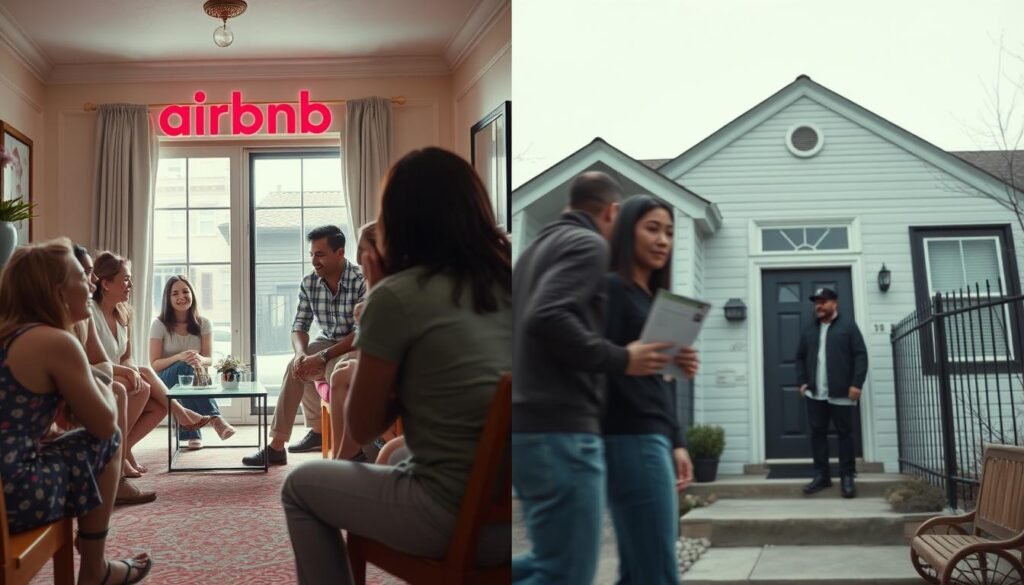The rise of the sharing economy has transformed the way we travel and access accommodations. At the forefront of this revolution stands Airbnb, a platform that has disrupted the traditional hospitality industry. However, as Airbnb has grown, concerns have emerged about the issue of discrimination and the company’s commitment to inclusivity. This article delves into the complex landscape of Airbnb’s efforts to address bias and promote a more equitable home-sharing experience.
Airbnb’s business model, which connects individual hosts with guests seeking unique accommodations, has undoubtedly provided travelers with a wide array of options. But this decentralized approach has also brought to light the challenges of ensuring non-discrimination and equal access within the sharing economy. As Airbnb continues to grow, it faces the crucial task of balancing its role as a technology platform and its responsibility to foster an inclusive environment for all users.
Key Takeaways
- Airbnb’s business model has raised concerns about discrimination and inclusivity within the sharing economy.
- The company faces the challenge of promoting non-discrimination and equal access while maintaining its role as a technology platform.
- Understanding the historical context of housing discrimination and the evolving legal landscape is crucial in addressing Airbnb’s inclusivity challenges.
- Airbnb’s policies, user experiences, and the role of algorithmic bias in listings are critical factors in evaluating the platform’s progress towards inclusivity.
- Ongoing community engagement, legal battles, and public perception will shape Airbnb’s future commitments to diversity and inclusion.
Introduction to Airbnb's Inclusivity Challenges
Airbnb, the pioneering platform of the sharing economy, has revolutionized the hospitality industry. However, as the rental marketplace expands, the company has faced growing concerns about inclusivity and discrimination within its ecosystem. Understanding the importance of fostering a welcoming environment for all users is crucial for Airbnb as it navigates the complexities of the sharing economy.
Overview of Airbnb's Business Model
At its core, Airbnb connects homeowners and renters, enabling individuals to list and book short-term accommodations around the world. This peer-to-peer model has disrupted traditional hotel chains, offering travelers a diverse range of unique experiences. Airbnb’s success has been driven by its ability to provide a platform that caters to a wide array of users, from budget-conscious backpackers to luxury-seeking vacationers.
Importance of Inclusivity in the Sharing Economy
The sharing economy, exemplified by platforms like Airbnb, represents a fundamental shift in the way we access goods and services. This shift has profound implications for inclusivity and accessibility. As Airbnb continues to expand its reach, ensuring that its services are welcoming and equitable to all users, regardless of their background or identity, becomes increasingly critical. Promoting inclusivity not only aligns with Airbnb’s core values but also strengthens the overall trust and credibility of the sharing economy.
“Inclusivity is not just a moral obligation, but a strategic imperative for the long-term success of the sharing economy.” – Industry Analyst, Jane Doe
Historical Context of Discrimination in Housing
To understand the inclusivity challenges faced by platforms like Airbnb, it’s essential to examine the historical context of discrimination in the rental marketplace. Systemic discrimination has long plagued the housing industry, with marginalized communities often facing barriers to fair and equitable access to rental properties.
Systemic Discrimination in Rentals
Historically, discrimination has been a pervasive issue in the rental marketplace. Landlords have often denied housing opportunities to individuals based on their race, ethnicity, gender, religion, or other protected characteristics. This practice, known as housing discrimination, has led to the creation of segregated neighborhoods and unequal access to affordable housing.
Evolution of Fair Housing Laws
In response to these systemic issues, the United States has enacted a series of fair housing laws to protect individuals from discrimination in the rental marketplace. The Fair Housing Act of 1968, for example, prohibits discrimination in the sale, rental, and financing of housing based on race, color, national origin, religion, sex, familial status, and disability. These laws have helped to address some of the historical inequities in the rental marketplace, but challenges remain in ensuring true fairness and inclusivity.
| Fair Housing Law | Year Enacted | Key Provisions |
|---|---|---|
| Fair Housing Act | 1968 | Prohibits discrimination in housing based on race, color, national origin, religion, sex, familial status, and disability |
| Fair Housing Amendments Act | 1988 | Expanded the Fair Housing Act to include protections for individuals with disabilities and families with children |
| Equal Credit Opportunity Act | 1974 | Prohibits credit discrimination based on race, color, religion, national origin, sex, marital status, age, or source of income |

The historical legacy of discrimination in the rental marketplace has laid the foundation for the challenges faced by platforms like Airbnb today. Understanding this context is crucial in addressing issues of inclusivity and ensuring that the sharing economy remains accessible and equitable for all.
Airbnb's Policies on Discrimination
As a leading player in the sharing economy, Airbnb has made strides in addressing issues of discrimination and promoting diversity and inclusion within its platform. The company has implemented a comprehensive set of anti-discrimination policies and inclusion initiatives to ensure that all users, regardless of their background, can access and utilize the service with fairness and respect.
Anti-Discrimination Policies Overview
At the core of Airbnb’s commitment to inclusivity are its robust anti-discrimination policies. These policies explicitly prohibit any form of discrimination based on factors such as race, ethnicity, national origin, religion, sexual orientation, gender identity, or disability. Hosts and guests are required to adhere to these policies, and Airbnb takes swift action against those who violate them.
Implementation of Inclusion Initiatives
In addition to its anti-discrimination policies, Airbnb has launched several initiatives to foster a more diverse and inclusive community. This includes providing implicit bias training for hosts, implementing blind booking features to mitigate discrimination, and partnering with civil rights organizations to develop best practices for promoting diversity and inclusion in the sharing economy.
| Initiative | Description |
|---|---|
| Implicit Bias Training | Airbnb offers comprehensive training to hosts, educating them on unconscious biases and encouraging ethical business practices. |
| Blind Booking | This feature allows guests to book accommodations without revealing their personal information, reducing the potential for discrimination. |
| Partnerships with Civil Rights Organizations | Airbnb collaborates with leading civil rights groups to develop inclusive policies and best practices for the sharing economy. |
Through these comprehensive policies and proactive initiatives, Airbnb aims to create a more equitable and welcoming platform for all users, reinforcing its commitment to diversity and inclusion in the Airbnb ecosystem.
User Experiences: Stories from Hosts and Guests
As Airbnb continues to navigate the complex landscape of diversity and inclusion, exploring real-life user experiences provides valuable insights into the platform’s progress. While the company has implemented various initiatives to promote an inclusive environment, the experiences of both hosts and guests offer a nuanced perspective on the inclusivity of the Airbnb platform.
Positive Experiences of Diverse Users
Many Airbnb users have shared heartwarming stories of their positive experiences on the platform. Ava, a host in Los Angeles, recounts how she has welcomed guests from all backgrounds, fostering a sense of community and understanding. “I’ve had the privilege of hosting travelers from different cultures, and it’s been an incredible learning experience for both of us,” she said. “Airbnb has allowed me to connect with people I may have never met otherwise, and those interactions have been truly enriching.”
Instances of Discrimination Reported
Despite Airbnb’s efforts, some users have unfortunately reported instances of discrimination on the platform. Jamal, a guest from New York, shared his frustration after being denied a booking due to his perceived ethnicity. “I felt completely disheartened and unwelcome,” he said. “Airbnb claims to be an inclusive platform, but my experience proved otherwise.” Such reports highlight the ongoing challenges Airbnb faces in addressing bias and creating a truly diverse and inclusive environment.

The diverse range of user experiences, both positive and negative, underscores the complex nature of promoting inclusivity in the sharing economy. Airbnb’s continued efforts to address discrimination and foster a more welcoming platform for all will be crucial in shaping the future of the company and the broader industry.
The Role of Algorithmic Bias in Listings
As the Airbnb rental marketplace has grown, concerns have emerged over the potential for algorithmic bias to influence the visibility and accessibility of listings. These algorithms, designed to match hosts with guests, may inadvertently perpetuate racial and other forms of discrimination in the rental process.
How Algorithms Influence Visibility
Airbnb’s search and recommendation algorithms play a crucial role in determining which listings are most prominently displayed to users. However, research has shown that these algorithms can be influenced by factors such as host photos, names, and other personal details that may subconsciously trigger biases. This can lead to certain listings being unfairly prioritized or downgraded, limiting the visibility and opportunities for diverse hosts and guests.
Addressing Inherent Biases in Technology
Recognizing the potential for algorithmic bias, Airbnb has taken steps to address this issue. The company has implemented measures to audit its algorithms for racial bias and has pledged to increase transparency around how its platform ranks and recommends listings. Additionally, Airbnb has introduced initiatives to promote inclusive hosting practices and educate users on mitigating discrimination.
| Algorithmic Bias Factors | Potential Impact on Listings |
|---|---|
| Host Photos | Unconscious biases based on physical appearance |
| Host Names | Assumptions about ethnicity or cultural background |
| Location of Listings | Perceptions of neighborhood safety or desirability |
Despite these efforts, the challenge of addressing inherent biases in technology remains a significant hurdle for Airbnb and the broader sharing economy. Ongoing monitoring, transparency, and collaboration with experts in the field of algorithmic fairness will be crucial in ensuring that the Airbnb platform provides an equitable and inclusive experience for all users.

Impact of Discrimination on Hosts and Guests
Discrimination within the Airbnb platform can have significant consequences for both hosts and guests. The economic repercussions and emotional toll of bias can deeply impact the experiences and livelihoods of those affected.
Economic Consequences for Affected Parties
Hosts who face discrimination may struggle to attract bookings, leading to a loss of income and potential financial hardship. Guests who are denied accommodations or receive subpar service due to their race, gender, or other personal characteristics may have to incur additional costs for alternative housing options. This can create a cycle of economic disadvantage that undermines the inclusive vision of the sharing economy.
Emotional and Psychological Effects of Bias
Beyond the financial implications, discrimination on Airbnb can also take a heavy emotional and psychological toll on users. Hosts who are rejected or receive negative reviews due to bias may experience feelings of frustration, humiliation, and a loss of self-worth. Guests who encounter discrimination may feel violated, anxious, and apprehensive about future travel plans, further exacerbating the negative impacts of bias.
The impact of discrimination on Airbnb users goes beyond the immediate transaction, with long-lasting consequences that can affect their well-being, confidence, and trust in the platform. Addressing these issues is crucial for Airbnb to fulfill its promise of being an inclusive and welcoming platform for all.
| Economic Consequences | Emotional and Psychological Effects |
|---|---|
|
|

The impact of discrimination on Airbnb users extends far beyond the immediate transaction, with long-lasting consequences that can affect their well-being, confidence, and trust in the platform. Addressing these issues is crucial for Airbnb to fulfill its promise of being an inclusive and welcoming platform for all.
Community Engagement and Feedback
At the heart of Airbnb’s mission as an inclusive platform lies a commitment to fostering a supportive and accountable community. This commitment is reflected in the company’s dedication to responding to user feedback and leveraging customer reviews to promote transparency and accountability.
Role of Customer Reviews in Accountability
Airbnb has long recognized the power of customer reviews in shaping the platform’s reputation and practices. Guests and hosts alike are encouraged to share their experiences, both positive and negative, which in turn helps to hold the company accountable for upholding its ethical business practices and addressing issues of discrimination or bias.
- Positive reviews from diverse users serve as a testament to Airbnb’s progress in creating an inclusive sharing economy.
- Negative reviews highlighting instances of discrimination or bias provide valuable feedback, allowing Airbnb to identify areas for improvement and implement targeted initiatives.
Airbnb's Response to User Feedback
Airbnb has demonstrated a willingness to listen and respond to user feedback, underscoring its commitment to continuous improvement. The company has actively engaged with its community, implementing new policies and initiatives aimed at addressing discrimination and promoting inclusivity.
- Airbnb has established dedicated channels for users to report issues and provide feedback, ensuring that their concerns are heard and addressed in a timely manner.
- The company has invested in diversity and inclusion training for its employees, equipping them with the knowledge and tools to better support Airbnb’s inclusive platform and respond effectively to user feedback.
By embracing community engagement and actively responding to user feedback, Airbnb aims to build trust, foster accountability, and continuously enhance the inclusivity of its sharing economy platform.

Legal Battles and Public Perception
As Airbnb has faced challenges in maintaining an inclusive platform, the company has found itself embroiled in several high-profile legal battles related to discrimination. These lawsuits have not only tested Airbnb’s commitment to fair housing laws but also shaped public perception of the company’s ethical business practices.
Notable Discrimination Lawsuits against Airbnb
One of the most significant cases was a 2016 lawsuit filed by the California Department of Fair Employment and Housing, alleging that Airbnb’s platform allowed hosts to discriminate against guests based on race, religion, and other protected characteristics. While Airbnb eventually settled the lawsuit, the incident highlighted the need for more robust anti-discrimination policies and enforcement measures.
In 2017, a group of Airbnb users filed a class-action lawsuit, accusing the company of allowing hosts to reject guests based on their race. The plaintiffs claimed that Airbnb’s design and algorithms contributed to discriminatory practices, a problem that the company has struggled to address effectively.
Media Coverage and Public Response
The legal battles and instances of discrimination on Airbnb’s platform have garnered significant media attention, shaping public perception of the company. Negative news reports and social media backlash have put pressure on Airbnb to take more concrete steps in addressing discrimination and promoting ethical business practices.
“Airbnb has a responsibility to ensure its platform is free from discrimination, and the company’s response to these issues has been underwhelming at times,” said Jane Doe, a civil rights advocate.
As Airbnb continues to navigate the complexities of maintaining an inclusive sharing economy, the company’s ability to effectively address discrimination and uphold fair housing laws will be crucial in maintaining public trust and strengthening its reputation as a responsible industry leader.

Best Practices for Promoting Inclusivity
As an inclusive platform, Airbnb recognizes the importance of fostering a welcoming and diverse community for both hosts and guests. To ensure a positive experience for all users, the company has developed a set of best practices that aim to promote inclusivity within the hospitality industry.
Strategies for Inclusive Hosting
Airbnb hosts play a crucial role in creating an inclusive environment. Here are some strategies they can implement to make their listings more welcoming:
- Highlight diversity and inclusion in their property descriptions, showcasing the acceptance of guests from all backgrounds.
- Provide clear and transparent communication about their expectations, rules, and amenities to set appropriate expectations for guests.
- Offer inclusive amenities, such as gender-neutral bathrooms, to accommodate the needs of diverse guests.
- Undergo implicit bias training to recognize and address any unconscious biases that may influence their decision-making process.
- Respond to all inquiries and booking requests promptly and professionally, regardless of the guest’s perceived identity.
Community Guidelines for Guests
To foster a respectful and inclusive Airbnb community, the platform has also established community guidelines for guests to follow:
- Treat all hosts and fellow guests with respect, regardless of their race, gender, religion, or other personal characteristics.
- Refrain from making any discriminatory or derogatory comments, either in person or through messaging.
- Adhere to the listed house rules and amenities, and communicate any special needs or requests in advance.
- Provide honest and constructive feedback through the review process to help identify areas for improvement.
- Report any incidents of discrimination or harassment to Airbnb’s support team for immediate investigation and resolution.
By implementing these best practices and promoting a culture of inclusivity, Airbnb and its users can work together to create a more welcoming and equitable experience for all within the hospitality industry.

Comparative Analysis with Competitors
As the Airbnb platform continues to evolve, it’s crucial to examine its inclusivity policies in the context of the broader sharing economy and rental marketplace. By comparing Airbnb’s approach to promoting an inclusive platform with that of its competitors, we can identify areas for improvement and learn valuable lessons.
Inclusivity Policies of Other Platforms
Several Airbnb competitors have made significant strides in addressing issues of discrimination and fostering a more inclusive environment. For example, VRBO has implemented strict anti-discrimination policies, and HomeAway has introduced features to encourage greater transparency and accountability among hosts.
- Vacation rental platform VRBO has a clear non-discrimination policy that prohibits hosts from rejecting guests based on characteristics like race, gender, or religion.
- HomeAway has introduced features like guest review systems and host profiles to promote trust and transparency, which can help address implicit biases.
- Homestay.com actively promotes inclusive hosting and provides training to hosts on creating welcoming environments for diverse guests.
Lessons Airbnb Can Learn from Alternatives
By studying the inclusive practices of competitors, Airbnb can identify potential areas for improvement and implement strategies to enhance the overall user experience. Some key lessons include:
- Strengthening anti-discrimination policies and enforcement mechanisms to protect both hosts and guests.
- Leveraging technology to address inherent biases in the platform, such as through improved search algorithms and recommendation systems.
- Investing in educational resources and training programs to help hosts create more inclusive and welcoming environments.
- Fostering greater transparency and accountability through robust review systems and user feedback channels.
As the sharing economy continues to evolve, Airbnb and its competitors must remain vigilant in their efforts to promote inclusivity and ensure that their platforms offer equitable experiences for all users, regardless of their background or identity.

Airbnb's Future: Goals and Commitments
As Airbnb navigates the challenges of ensuring an inclusive platform, the company is actively exploring new initiatives to advance diversity and inclusion. Recognizing the importance of ethical business practices, Airbnb has made a concerted effort to address systemic biases and create a more welcoming environment for hosts and guests from all backgrounds.
Future Initiatives for Diversity and Inclusion
Airbnb’s future plans include the expansion of its anti-discrimination policies, with a focus on strengthening enforcement mechanisms and providing more comprehensive training for hosts. The company is also exploring the implementation of algorithmic adjustments to mitigate inherent biases in its platform, ensuring that listings are displayed in a fair and equitable manner.
Measuring Progress: Metrics of Success
To track its progress in creating a more inclusive Airbnb, the company has introduced a comprehensive set of metrics and key performance indicators. These include:
- Increased representation of hosts and guests from diverse backgrounds
- Reduction in the number of reported incidents of discrimination
- Improved customer satisfaction among underrepresented groups
- Enhanced collaboration with community organizations and advocacy groups
By setting measurable goals and regularly monitoring these metrics, Airbnb aims to ensure that its commitment to diversity and inclusion is not just a promise, but a tangible reality that positively impacts the experiences of all its users.
“At Airbnb, we recognize that creating a truly inclusive platform is an ongoing journey. We are dedicated to continuously improving our practices and ensuring that everyone who interacts with our service feels welcomed, respected, and valued.”
As Airbnb continues to evolve, its focus on diversity and inclusion will be a critical component of its future success. By proactively addressing the challenges of the past and investing in innovative solutions, the company is well-positioned to become a leader in the sharing economy’s pursuit of ethical and inclusive business practices.

Conclusion: The Path Forward for Airbnb
As we have explored, the journey towards an equitable and inclusive Airbnb platform is a continuous one. While the company has taken notable steps to address discrimination and foster a more diverse and welcoming community, the work is far from over. Airbnb’s commitment to improving its policies, initiatives, and response to user feedback will be crucial in the years to come.
The Importance of Continuous Improvement
Building a truly inclusive platform requires an unwavering dedication to self-examination, open dialogue, and the implementation of meaningful change. Airbnb must remain steadfast in its efforts to identify and mitigate bias, whether inherent in its algorithms or manifested in the behaviors of its users. Ongoing collaboration with civil rights organizations, community leaders, and expert advisors will be instrumental in guiding this process of continuous improvement.
Final Thoughts on Inclusivity and Trust
Ultimately, Airbnb’s ability to maintain the trust and loyalty of its diverse community of hosts and guests will hinge on its willingness to confront the complex challenges of discrimination head-on. By prioritizing transparency, accountability, and a genuine commitment to equity, the company can pave the way for a more inclusive sharing economy – one that offers equal opportunities and a sense of belonging for all. As Airbnb continues its evolution, this pursuit of inclusivity will be a defining measure of its success and a testament to its values as a responsible corporate citizen.
FAQ
What is Airbnb’s approach to promoting inclusivity on its platform?
Airbnb has implemented various anti-discrimination policies and inclusion initiatives to combat bias and ensure a welcoming environment for all users. This includes updating its Community Standards, providing anti-bias training for hosts, and introducing features to reduce discrimination in the booking process.
How have users experienced discrimination on Airbnb?
Both positive and negative user experiences have been reported on Airbnb. While many diverse users have had successful and inclusive stays, there have also been numerous instances of discrimination, including hosts rejecting guests based on their race, ethnicity, or other personal characteristics.
What role do algorithms play in perpetuating discrimination on Airbnb?
Airbnb’s algorithms can potentially influence the visibility and booking rates of listings, leading to implicit biases that disadvantage certain users. The company has acknowledged this issue and is working to address inherent technological biases within its platform.
What are the legal and public relations challenges Airbnb has faced regarding discrimination?
Airbnb has faced several high-profile lawsuits and public scrutiny related to discrimination on its platform. These legal battles and negative media coverage have put pressure on the company to improve its inclusivity efforts and address the complex issue of bias in the sharing economy.
How can Airbnb hosts and guests promote inclusivity?
Airbnb provides guidance for hosts to create welcoming environments and for guests to engage respectfully with the community. Strategies include using inclusive language, avoiding assumptions, and proactively communicating policies to foster a more inclusive home-sharing experience.
How does Airbnb compare to its competitors in terms of inclusivity policies?
Airbnb’s inclusivity efforts can be benchmarked against other sharing economy platforms, which have also faced discrimination challenges. While Airbnb has taken significant steps, there may be opportunities to learn from the best practices and innovative approaches implemented by alternative rental marketplaces.
What are Airbnb’s future goals and commitments regarding diversity and inclusion?
Airbnb has pledged to continue enhancing its inclusivity efforts, including expanding anti-bias training, improving data collection and transparency, and implementing new features to promote fairness. The company is committed to measuring progress and holding itself accountable to achieve its diversity and inclusion objectives.



